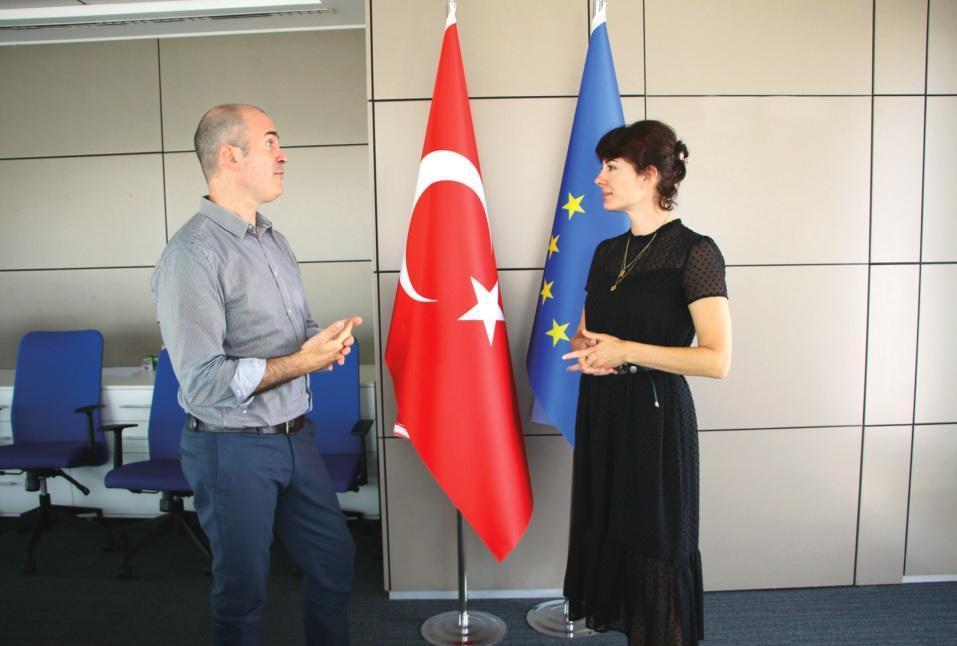
The COVID-19 outbreak has deteriorated the situation of refugees in Turkey and they have started to implement negative coping mechanisms, an official from the European Union humanitarian aid agency said.
“Studies show that there was a deterioration in the situation of refugees. It started during the pre-pandemic. The COVID-19 outbreak amplified and deteriorated their situation drastically,” Devrig Velly, the program team leader for European Civil Protection and Humanitarian Aid Operations (ECHO) in Turkey, told Hürriyet Daily News in an interview.
“They have started to implement some negative coping mechanisms such as relying on cheaper food items, reducing food quantities and reducing the number of meals per day. They are going into more debt in this period,” he said.
He pointed at the fact that child labor also increased during the outbreak. “When they send the kid outside, taking him out of school and putting him on the street is an extremely negative coping mechanism,” the EU official added.
In response, the ECHO and Turkish authorities have agreed to increase a monthly unconditional cash transfer aimed to help the most vulnerable among the refugee population in the country.
The EU is in close cooperation with Turkish authorities and has been funding humanitarian projects to help the most vulnerable since 2015 and has supported more than 80 humanitarian projects contracted with 22 partner organizations.
The Emergency Social Safety Net (ESSN) is one of the EU’s humanitarian flagship programs in Turkey and aims to meet their daily needs through cash assistance. The social assistance scheme assists more than 1.8 million people in the country.
The allowance used to be 120 Turkish Liras per person, but “because of the economic situation in the country and the COVID-19 situation, this amount has been increased to 155 liras (approximately 15 euros) since April,” the ECHO official said.
Since 2017, the EU has also been supporting vulnerable refugee families whose children attend school regularly through bi-monthly cash transfers under the Conditional Cash Transfers for Education (CCTE).
“At the core of these projects is to support children on enrollment and attendance to the schools. There are a bit more than a million children refugees at school age in Turkey. We are supporting more than 685,000 children,” the ECHO official said, noting that more than 60 percent of the children are integrated into the Turkish system.
But still, 40 percent is out of school, and they are developing projects to ensure that out-of-school children are integrated into the system, he added.
This project mirrors a system that the Turkish authorities created 15 years ago for its vulnerable citizens.
The CCTE allowance is between 35 and 55 liras every two months, with additional 100 liras at the beginning of the school year and also at the mid-term to help to buy school equipment. The family will not receive support if the child does not attend school for more than 80 percent of the time.
“We know it is not enough; it is a small support that allows the family to consider enrollment and attendance,” he said.
The ECHO has partnered with UNICEF and the International Federation of the Red Cross and Red Crescent Societies for the programs implemented by the Turkish Red Crescent and Turkish ministries.
‘Turkey’s program is unique’
Philippe Cori, the deputy director of UNICEF Regional Office for Europe and Central Asia, stressed that the program in Turkey was “very unique” and that they are using the systems of the country.
“We are further building the system. We are building a more resilient system. Many countries need that,” he said during an online question-and-answer session with the media.
Recalling that some 40 percent of the refugee children in Turkey still need enrollment to the education system, he stressed that they need more effort.
Thanking the program partners and Turkish authorities, Cori said, “We hope that soon this conflict will fade away. It will take some time. But continuing to bring hope, continuing to bring a sense of belonging to a community, building resilient families in this troubled time is something that is important not just for the community but for humanity.”
Refugee kids learn Turkish before enrolling in regular school
The family of Musab, which includes Musab’s wife, Farise, and their three kids, had to move to southern Gaziantep province from Syria’s northern Aleppo province in 2019. They are one of the beneficiaries of the support programs by the ECHO, UNICEF and Turkey.
Two of the children attend the Accelerated Learning Program (ALP) for the Turkish language and benefit from the CCTE program. One of the kids was suffering from psychological distress due to the long-term war exposure and was not willing to attend the classes. He was referred to counseling services to meet counselors to motivate him.
Asked by Hürriyet Daily News during an online field visit, Musab said they also faced difficulties during the pandemic, adding that his kids took online courses using a single mobile phone, but that the lessons were beneficial for his children. His kids will enroll in regular Turkish schools after ALP courses.